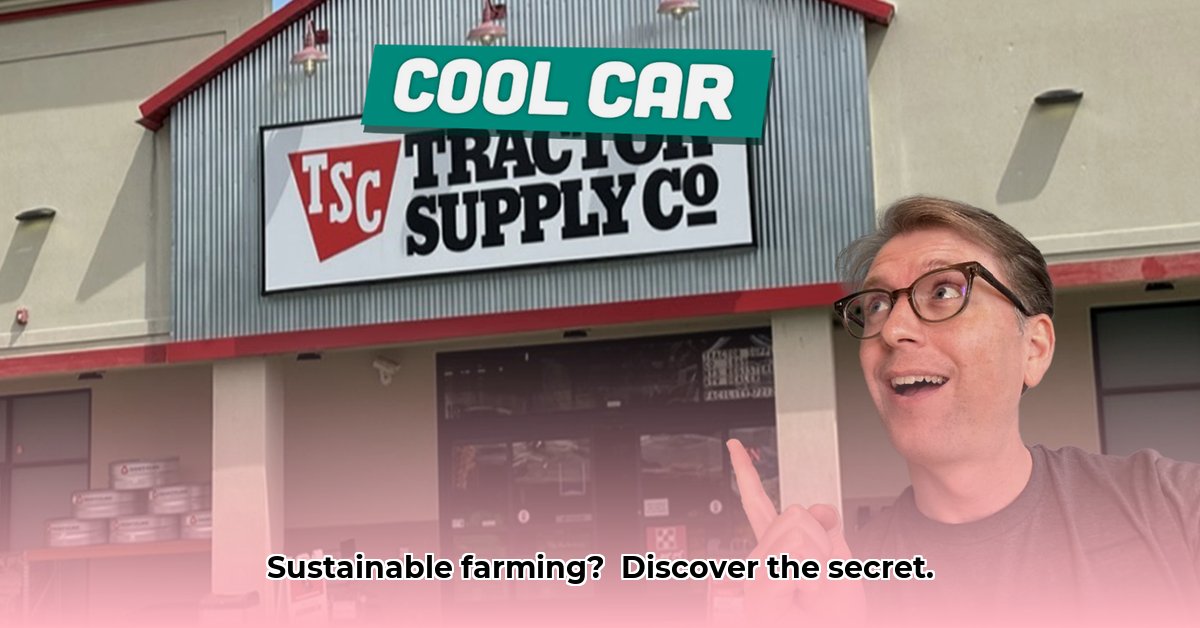
Tractor Supply Company (TSC) in Middle River holds a significant position within the local farming community, supplying essential goods ranging from seeds and fertilizers to tools and animal feed. However, the extent of its contribution to sustainable agriculture remains a subject requiring closer examination. While the store's diverse product range could support eco-friendly farming practices, a lack of transparency concerning its operational sustainability hinders a comprehensive assessment. This article explores TSC Middle River's role, identifies areas for improvement, and proposes actionable steps for a more sustainable future. For more information on TSC Middle River, visit their website.
Understanding TSC Middle River's Role in Sustainable Agriculture
TSC Middle River's vast inventory could significantly contribute to sustainable farming. For instance, the availability of organic seeds could facilitate a transition towards more environmentally conscious agriculture within the community. Similarly, the provision of tools and equipment designed for efficient water usage represents another potential avenue for positive impact. However, a critical gap exists: a lack of clear information regarding the extent to which TSC actively promotes or prioritizes such sustainable products. This opacity prevents a definitive evaluation of its actual contribution to local sustainable agriculture.
The Need for Transparency: Assessing TSC's Environmental Footprint
A significant obstacle to evaluating TSC Middle River's sustainability is the scarcity of publicly accessible data regarding its environmental practices. Key information, such as waste generation, carbon footprint from transportation and energy consumption, and the environmental impact of its supply chain, remains unavailable. This lack of transparency significantly impedes a thorough assessment of TSC's commitment to helping farmers reduce their environmental impact. Shouldn't a company's environmental responsibility be readily apparent to its stakeholders? Consumers are increasingly prioritizing transparency and accountability in their purchasing decisions.
Dr. Emily Carter, Environmental Scientist at the University of Maryland, emphasizes, "Transparency is paramount for building trust and fostering sustainable practices. Without readily available data on a company's environmental impact, it's impossible to gauge their true commitment to sustainability."
Taking Action: Steps for TSC and Consumers
Building a sustainable agricultural community requires a collaborative effort involving TSC, consumers, and potentially local government. Specific actions are crucial to foster meaningful change.
For Tractor Supply Company Middle River:
Conduct a Comprehensive Sustainability Audit: A detailed environmental audit would quantify TSC's footprint, providing a baseline for improvement. This audit should rigorously assess energy usage, waste generation, water consumption, and the environmental impact of its entire supply chain. Independent verification of this audit would strengthen its credibility.
Publicly Share Environmental Data: Transparency builds trust. Openly sharing audit results, alongside a clear commitment to reducing its environmental impact, would demonstrate TSC's accountability to the community.
Invest in Employee Sustainability Training: Equipping staff with knowledge about sustainable farming practices empowers them to advise customers effectively and promote more environmentally friendly choices.
Partner with Local Nonprofits: Collaborating with local organizations dedicated to sustainable agriculture can provide valuable insights, foster community engagement, and lead to joint educational programs.
For Consumers:
Make Informed Choices: Actively choose sustainable products when shopping at TSC. Support companies demonstrating a commitment to environmental responsibility.
Demand Transparency: Inquire about TSC's sustainability initiatives and the environmental impact of the products they offer. This consumer pressure can drive meaningful change.
Support Sustainable Businesses: Prioritize businesses committed to environmental responsibility, reinforcing positive actions.
Potential Challenges and Solutions: Mitigating Environmental Risks in Agriculture
Agriculture inherently involves environmental risks. Addressing these risks requires proactive measures.
| Technology/Practice | Potential Environmental Risk | Mitigation Strategy |
|---|---|---|
| Pesticide Use | Soil and Water Contamination | Promote organic alternatives; provide clear labeling; educate customers on responsible application. |
| Agricultural Water Usage | Water Scarcity and Depletion | Promote water-efficient irrigation; partner with water conservation experts. |
| Packaging Waste | Landfill Waste | Transition to sustainable packaging; encourage customer recycling. |
| Supply Chain Sustainability | Environmental Impact of Sourcing | Conduct regular supplier audits; enforce ethical and environmental codes; report progress publicly. |
A Greener Future for Agriculture in Middle River
The agricultural landscape demands sustainable practices. For TSC Middle River, embracing sustainability isn't merely an environmental responsibility; it represents a commitment to the long-term health and prosperity of the farming community. By embracing transparency, collaborative efforts, and continuous improvement, TSC Middle River can contribute significantly to creating a more sustainable and thriving agricultural ecosystem.